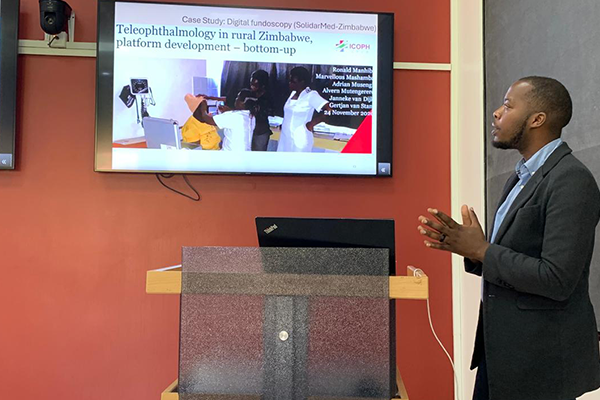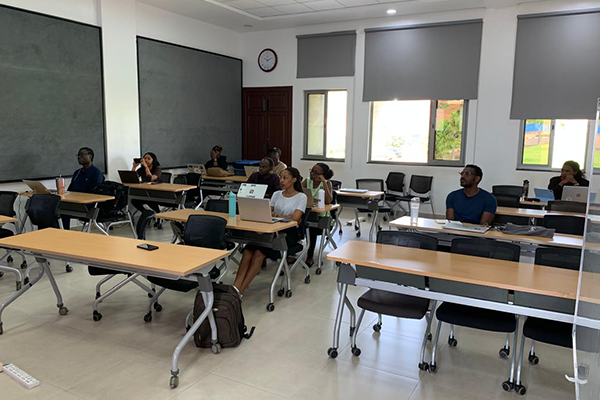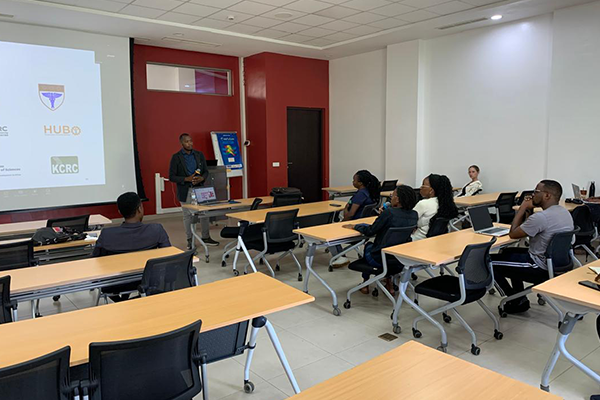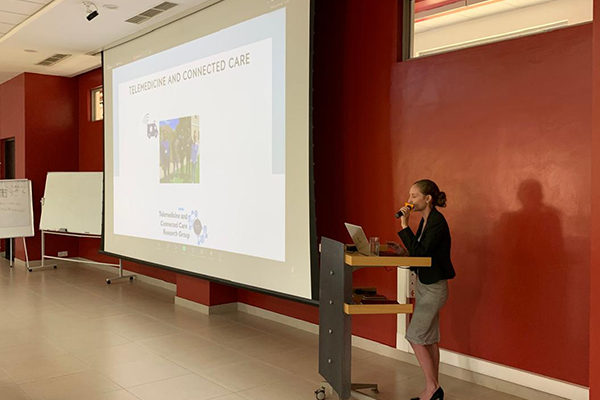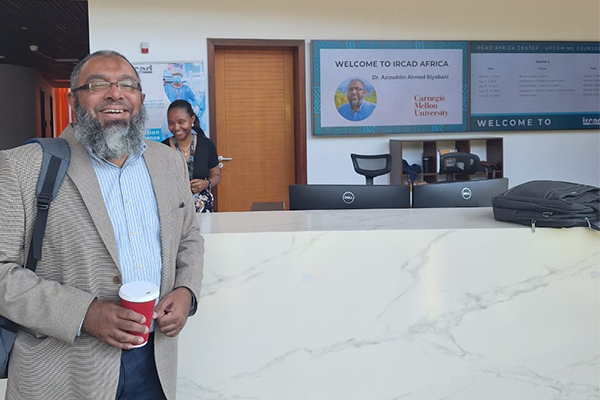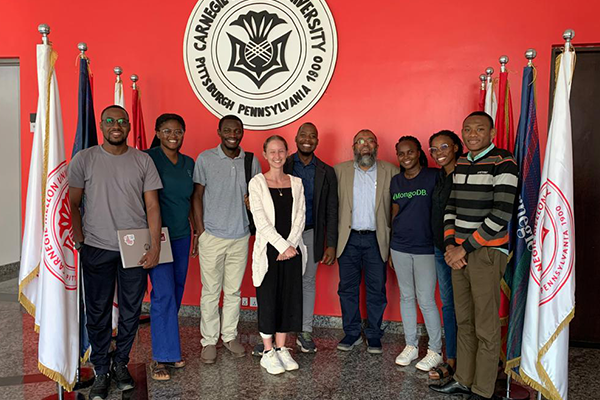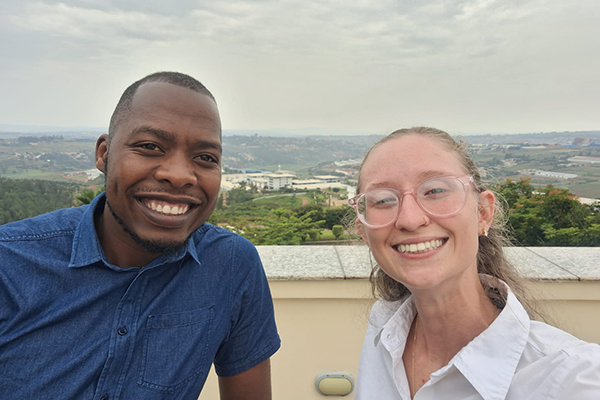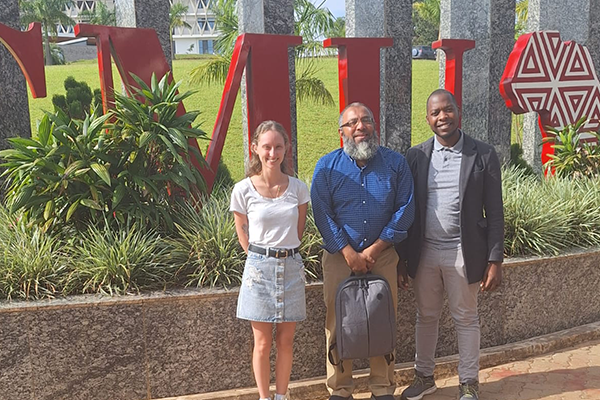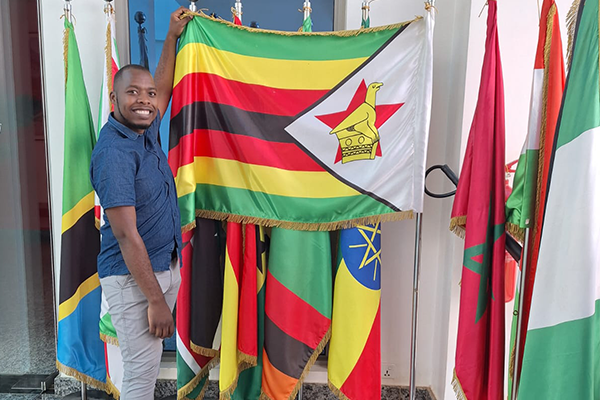Mini courses, full-size experience
Sarah Maenner
Feb 27, 2025
Minis are courses unique to Carnegie Mellon University, and they are offered in both Pittsburgh and Kigali. As their name suggests, they are shorter than regular course offerings, lasting only half of the semester (seven weeks) and granting half the number of units as a full-length course. Students often take two mini courses to equal the coursework of one regular course. Minis are offered on a number of topics, and they are great for getting an introduction to that topic, or for hands-on project experience.
CMU offers hundreds of minis each semester, but here, we'd like to introduce you to two of them. These minis, Planning for Digital Transformation and Project in AI for Healthcare, are designed for first-year graduate students so they can get early project and research experience. Both courses are offered at CMU-Africa, and are taught by associate teaching professor Ahmed Biyabani.
"I put together these minis because many of our students are interested in and are encouraged to do research, but very few of them get to define these projects ahead of time," Biyabani said. "By having a couple of minis prior to the summer, second-semester students can get their feet wet, so to speak, and they can explore the topics and then dig down a little deeper."
In his classes, students work with data from across Africa and the world as they develop projects to solve actual problems, such as healthcare access and equity in urban areas and detecting diseases using algorithms. Students have published papers and presented at conferences based on the results of the projects they develop in Biyabani's mini courses.
04-801-S3 Planning for Digital Transformation
Planning for Digital Transformation is offered for six units in the first half of the spring semester, and it is centered around the concept of digital transformation—a topic of great importance to the digital future of Africa. The course starts at the definition of digital transformation and then explores the concept, investigating what it means with regards to the technology as well as implications on how a business’s culture and management respond. The course focuses on how digital transformation is managed and how it affects the business and the business’s customers.
This mini is organized like a seminar, as students read and discuss journal articles and case studies to help them concretely understand how digital technologies can affect products and services.
Students have enjoyed this structure; one student, J D'amour Nsanzimfura (MS EAI '25), said, "The brainstorming sessions push us to think beyond existing implementations and explore how emerging technologies can improve business processes, government services, and industry standards."
Another student, Nirel Kadzo (MS EAI '25), enjoyed "the class's focus on management-level thinking" and how it explored business units and practices.
The students called this an "ideal class" for those who want to combine technical knowledge with business strategy. In her career, Kadzo wants to effectively lead teams, and this course helped her understand how to strategically implement technologies and how organizations are likely to respond to those technologies, so now she can better lead her teams through technological shake-ups like the ones she learned about.
Nsanzimfura also appreciated the course’s focus on managing transformation. "I now have a deeper understanding of how to drive technology adoption, manage change, and consider regulatory and ethical factors in digital transformation efforts," he said.
By the end of the course, small teams of students will have developed a final project on a topic they choose, which they then present to the rest of the class. Nsanzimfura focused on improving ambulance services in urban areas, which required considering "factors like data-driven decision-making, infrastructure constraints, and policy implications." Meanwhile, Kadzo’s project focused on combining adaptive AR technology and ethical AI training on diverse data, to co-create product ecosystems that empower marginalized beauty consumers, and unlock underserved markets..
Planning for Digital Transformation has no prerequisites and is open to all students with a math and programming background in IT, engineering, or AI.
This semester, Biyabani welcomed two of his advisees, Abby Blocker and Prosper Magara, to Kigali to give guest lectures in Planning for Digital Transformation. The Ph.D. students from University of Cape Town are focused on using AI in healthcare on the continent. Blocker uses machine translation and large language models in work on virtual clinics, and Magara uses AI for blood loss detection for laparoscopic telesurgery.
04-801-T4 Project in AI for Healthcare
Project in AI for Healthcare is a 6-unit course offered in the second half of the spring semester. The students who take it are united by their interest in the intersection of AI and healthcare as well as usually having some background in AI or machine learning. This course is one of the few at either Pittsburgh or Kigali that formally combines machine learning and healthcare as students use real clinical data to improve healthcare problems, tackling different challenges to doing so.
The course is structured around projects that students create based on their interests, experience, and comfort, with the aim to develop feasible solutions using AI and machine learning algorithms. For her project, student Mona Aman (MS EAI '25) used ultrasound images to detect early breast cancer.
"I utilized an African dataset to better capture the characteristics of African patient populations and achieve high accuracy," she said. "Since ultrasound is more accessible than mammograms in rural areas, this project aimed to create a more practical and effective diagnostic tool for these settings."
For Aman, "this class provided valuable insights into ongoing research in the field, exposing me to different methodologies and real-world applications." These skills are vital as she aims to become a researcher in this field.
She said that she especially enjoyed analyzing papers, which introduced her to different methodologies, helping her determine where she fits into ongoing research. She also found the class discussions were helpful to fully understand key concepts, and she appreciated that the project-based class gave her early, hands-on experience in the field.
For first year students, minis are a great option to gain experience just before the summer, getting them ready to dive into bigger projects over the summer and in their second year.
